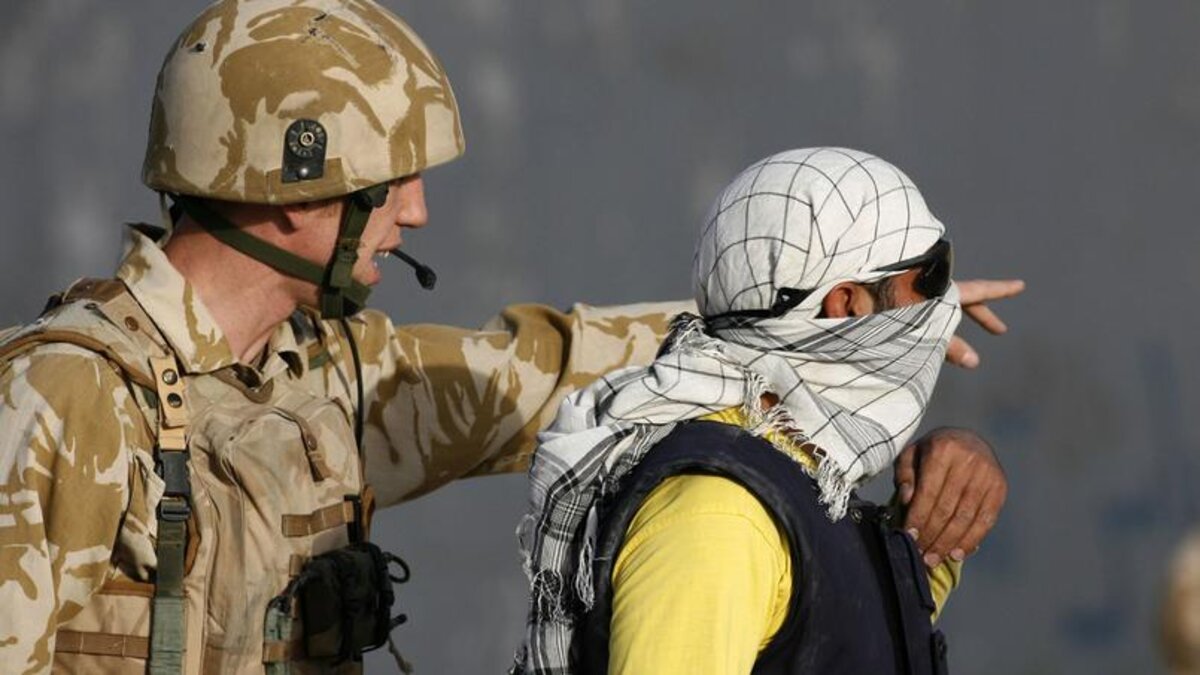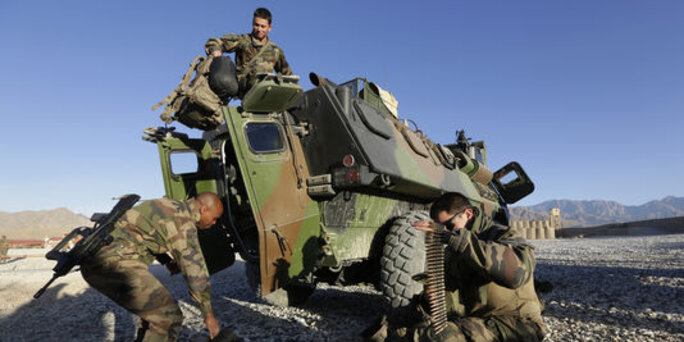For 12 years, Abdul worked as an interpreter for the French military in Afghanistan, right up until the last of the contingent, training personnel, left the country in 2014. “I worked in all the military domains,” he told Mediapart, in an interview by phone from his home in Kabul.
Abdul, whose last name is withheld on his request, is a former pupil of the Franco-Afghan Lycée (secondary school) in Kabul. When the French government set up a selective system offering its former interpreters and translators in Afghanistan the possibility to relocate to France, he believed he was a well-placed candidate.
In 2013 he prepared a dossier requesting resettlement in France for himself, his wife and three children. Out of a total of 700 local civilians who worked for the French military, 258 applied for relocation in France. Just 73 were granted permission.
In 2014 Abdul learnt that his application had been turned down. “After having studied your dossier with great attention, it transpires that you do not meet the criteria demanded by the French administration for such relocation,” read the letter Abdul received from the French embassy in Kabul, dated March 27th 2014 and co-signed by the commander of French forces in Afghanistan. “We therefore regret to tell you that your candidature has not been retained. We nevertheless ask you to believe in our profound gratitude for your actions alongside the French armed forces.”
It is hard to imagine that it was his employment record that was in question. Abdul had kept a careful record of numerous documents and photos relating to his work for the French armed forces, including letters from ranking officers and their character references.
In one letter written in 2005 by a French lieutenant-colonel in charge of an instruction programme with the Afghan army, Abdul is congratulated for being hard-working and ready at hand, and “of an affable and disinterested character”. In 2006, a colonel in charge of the French military’s joint training centre for intelligence activities wrote that Abdul “particularly merited being cited as an example” for his work. In 2008, the commander-in-chief of the French army’s broad training mission with the Afghan military, grouped under the name of the ‘Epidote detachment’, wrote of Abdul’s “fine human and professional qualities”, adding that he was “a man with resources and heart”.
Abdul, 51, says he cannot understand why his request to resettle in France was turned down. “Nobody wants to explain to us why,” he said. “The military tell us they are not responsible, and we don’t have access to the [French] embassy. It’s a bit sad. Why did the French friends leave us in danger? I don’t find the answer.”

Enlargement : Illustration 1

He wants to leave Afghanistan because he is frightened for his safety and the possible consequences for his family. Locals who worked for the international coalition in Afghanistan are regularly threatened with reprisals, notably from the Taliban, and the security situation has become critical. “Everyone knows us,” said Abdul. “We took part in official ceremonies. Our names, our faces have been seen. When I stopped work, I found a threatening letter in front of my door.”
He says he hardly goes out anymore, and that he regularly moves homes with his family to avoid being identified. “I am afraid for my children,” he added. “If I die, what will happen to them?” His only hope is that the French government will re-examine his request for relocation.
On March 5th this year, a small group of former interpreters for the French army who had been refused relocation to France held a demonstration in Kabul demanding that they be granted asylum. The protest was reported the following day on the website of French daily La Croix, prompting several lawyers in France to form a committee to help the cause of the rejected interpreters. The committee, called the Collectif d'avocats au service des auxiliaires afghans de l'armée française, now numbers 35 lawyers.
One of their two spokeswomen, lawyer Fenna Baouz, said they have to date received requests for help from 127 rejected interpreters. The lawyers intend taking legal action against the French government in the hope of obtaining entry visas for the interpreters, based on a legal precedent set by a court in Nantes, western France, in September 2014. In that case, a French interior ministry decision to refuse a short-term residency permit to a Syrian family living in the city of Aleppo, the scene of devastating bombardments by forces of the Damascus regime, was overturned by magistrates who cited France’s constitutional obligations to offer asylum to the mother and three children.
The committee of lawyers last month published an open letter to French President François Mitterrand calling for his direct intervention to allow the interpreters to relocate to France, and have launched an online petition in support for the interpreters’ cause.
'No-one rendered more service than the interpreters'
The plight of the interpreters serving the French military is far from unique. Britain’s treatment of interpreters who served its army in Afghanistan has also been highly criticised (see here and here), and initial rules of resettlement to the UK were eventually modified only after public outcry. Despite this, numerous cases of interpreters either refused asylum or insufficiently supported remain (see here and here).
France’s procedure for granting resettlement requests was set up as of June 2012, when the French army began preparing its pull-out from Afghanistan. A special commission to decide on asylum requests was established in Kabul, made up of diplomats and military officers, presided by the French ambassador to Afghanistan. Contacted by Mediapart, a French foreign ministry spokesperson said the commission based its judgments on “three principle criteria” which it described as “the current nature of the threat, the capacities for integration, and services rendered”. The foreign ministry said those who met those three criteria were granted entry visas, and underlined that the 73 candidates granted relocation represented a significant number. The ministry said that counting the interpreters’ and the members of their families accompanying them, a total of 175 people were granted asylum in France, with a residency permit valid for ten years and the provision of social service assistance.

In May 2014, Socialist Member of Parliament (MP) Jean-Louis Gagnaire submitted a question in writing to defence minister Jean-Yves Le Drian, asking the minister to detail what measures he would take to help the Afghan interpreters who were refused relocation to France. “For the French army, the question about the future of these interpreters is all the more sensitive because our military history remains forever marked by the abandonment and subsequent massacre of thousands of harkis during the withdrawal from Algeria,” wrote Gagnaire, referring to the Algerians who served the French army during the North African country’s bitter 1954-1962 war of independence from French colonial rule. Written questions by MPs do not require ministers to give an immediate response, but it nevertheless took the defence minister nine months to reply, in February this year.
In the event, Le Drian simply repeated the history of the filtering procedure in place, without addressing the question of the future of those interpreters who were refused relocation (some of whom were informed by a mobile phone text message, while others even never received any official notification).
The rejected interpreters cannot understand how they failed the three principle criteria which were applied for accepting or rejecting relocation applications - “the current nature of the threat, the capacities for integration, and services rendered”. Regarding the first, the security situation in Afghanistan, and Kabul, has deteriorated to such a degree that the threat to the safety of the interpreters is not an issue for debate. Regarding their capacity to integrate into French society, they are all bilingual, most often francophone and have graduated from higher education studies. As for services rendered, most of the rejected interpreters submitted documents relative to their activities for the French military.
“All that makes me laugh,” commented Amanullah Omid, an Afghan who served as an interpreter for the French army between 2006 and 2009, and who has lived in France since 2010 where he works as an employee of the Afghan embassy. “By signing contracts with the French army in order to earn a living, they’ve placed their lives in danger. Extremists, of all kinds, threaten us if they simply see a French phone number on our mobile or a visiting card in our wallet. In our country we are humiliated because we worked with foreigners […] No-one can render more service than these interpreters, who were alongside soldiers in the field, on the firing range, in classrooms or behind computers translating war manuals.”
Omid is just as dismissive of the suggestion that the rejected interpreters had failed to convince the French commission of their capacity to integrate. “The interpreters celebrated the New Year with the officers, we shared the parcels sent by their families, we laughed about cheese that stinks,” he said. “There was chocolate and red wine. We invited them into our families, to our marriages. Integration cannot be greater than that.”
A statement issued by the French foreign ministry late last month now offers a flicker of hope for the interpreters, amid the growing momentum of the campaign by the French lawyers’ committee set up to defend their rights, and after more written questions about their fate were tabled three weeks ago by MPs. “France has duties towards its personnel: if the fact of having worked with France cannot lead to an absolute right to settle [in the country], the reality of the danger at risk must obviously be taken into account,” read the statement issued on April 21st. Crucially, it pledged resettlement requests that were previously refused could be resubmitted, and that a judgment on both these and requests still under consideration would be made “within a delay of two months”.
The following day, representatives of the committee of lawyers met with presidential staff and were given the same reassurance.
Contacted by Mediapart, the French presidency, the prime minister’s office and the defence ministry all declined to comment on the issues raised in this article.
-------------------------
The French version of this article can be found here.
English version by Graham Tearse


